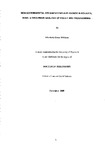NON-GOVERNMENTAL ORGANIZATIONS AND HIV/AIDS IN KOLKATA, INDIA: A DISCURSIVE ANALYSIS OF POLICY AND PROGRAMMING
| dc.contributor.author | Williams, Elizabeth Grace | |
| dc.contributor.other | Faculty of Arts, Humanities and Business | en_US |
| dc.date.accessioned | 2013-09-16T10:48:39Z | |
| dc.date.available | 2013-09-16T10:48:39Z | |
| dc.date.issued | 2009 | |
| dc.identifier | NOT AVAILABLE | en_US |
| dc.identifier.uri | http://hdl.handle.net/10026.1/1745 | |
| dc.description.abstract |
This thesis presents the findings from a study that explores the language and discourses of HIV/AIDS in India circulating at different levels of the policy process during the early years of the pandemic, with a particular focus upon the work of NGOs in Kolkata, West Bengal. The study was exploratory and used Walt and Gilson's (1994) analytic framework of content, context, actors and process to guide data collection. Eleven NGOs were identified for case studies using a snowballing technique. The research design used multiple methods of data collection including semi-structured interviews, informal interviews, participant observation, the keeping of a research diary, and the collection of documentary sources, including policy documents, grey literature and Behaviour Change Communication (BCC) material. The texts were analysed using discourse analysis following Carabine (2002). The study found that global and national level policies assigned a significant role to NGOs in three areas: prevention and control, care and support of people living with HIV/AIDS and the promotion of human rights. However, at the state level there was marked ambivalence about working with NGOs and considerable disagreement about the extent of the pandemic. HIV/AIDS was constructed as un-Bengali and a problem for marginalized and poor groups. The targeted interventions approach, adopted for use at the time, seemed to offer a mismatch between problem construction and responses. However several of the NGOs in the study were offering a package of holistic services in addition to the targeted interventions. NGOs faced the problem of how to share these experiences and understandings with the wider policy community as there was limited opportunity to do this. Further, the involvement of NGOs in care and support was limited and they faced difficulties in promoting a human rights based approach to their work, in part because of a lack of support from the State AIDS Prevention and Control Society (SAS). The findings suggest that, within the context of West Bengal, policies need to be realistic in the role assigned to NGOs in HIV/AIDS programming, clearly identify a role for the state in the promotion of human rights, and develop strategies to enable NGOs to contribute their knowledge and expertise to the policy process. | en_US |
| dc.language.iso | en | en_US |
| dc.publisher | University of Plymouth | en_US |
| dc.title | NON-GOVERNMENTAL ORGANIZATIONS AND HIV/AIDS IN KOLKATA, INDIA: A DISCURSIVE ANALYSIS OF POLICY AND PROGRAMMING | en_US |
| dc.type | Thesis | |
| plymouth.version | Full version | en_US |
| dc.identifier.doi | http://dx.doi.org/10.24382/4507 |
Files in this item
This item appears in the following Collection(s)
-
01 Research Theses Main Collection
Research Theses Main


